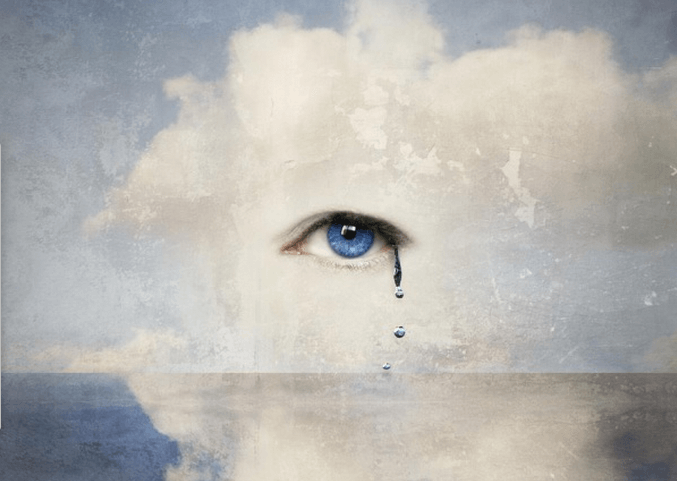What is Emotional Catharsis and Why Is It Good for Us?

Maybe you remember times in your life when you suddenly started crying because your emotions got the better of you and you couldn’t help it. And you just couldn’t stop crying. Or you had anger bottled up and then one day you exploded in uncontrollable rage. These experiences are part of the phenomenon known as emotional catharsis.
Emotional catharsis is a process in which our emotions are displayed in all their rawness. It is often associated with situations where we’re feeling intensely. Because it is such an intense expression of emotion, it concerns a lot of people and some even wonder if catharsis is dangerous.
But even though it’s often quite “dramatic,” the process of emotional catharsis is never dangerous. Quite the contrary — it is actually very liberating. It helps us understand and express what we’re feeling. It takes us beyond just intellectually assessing the adverse situation we’re in. Instead, we learn to not suppress our emotions; we let out all the emotional turmoil we were keeping in.
Expressing emotions is never dangerous. The danger lies in containing or denying them, because that makes us prisoners, instead of being free to live our lives to the fullest.

Emotional catharsis and therapy
When a person first starts psychological therapy, sometimes they worry that they’ll explode in emotional catharsis and talk nonsense. But, in most cases, what experts normally aim for in therapy is for the patient to recognize and validate their emotions. Why? To identify the experiences making us feel that way.
In fact, catharsis was a process Sigmund Freud used at the beginning of his psychoanalysis sessions. In these sessions Freud treated hysteria — which is really an illness of traumatic origin — using hypnosis. The goal was “purification” or emotional catharsis to release the shock or trauma. Then the patient would be able to express the repressed emotions and experiences causing the symptoms in the first place.
When emotions block or paralyze you, when you’ve kept strong and firm in life’s hardest situations, and suddenly you can’t cope any longer and you break… that’s when you get help processing these experiences and emotions through catharsis and its subsequent analysis.
That said, catharsis is important in therapies other than psychoanalysis, as well. In the psychodrama of authors like Moreno, catharsis is the goal of group therapy sessions. Here, the aim is to properly process the conflict that led you to get therapy.

Emotional expression is an essential part of us
All emotional expression, even something like emotional catharsis, must be validated and never suppressed. Keep in mind that emotions are a part of us. They make up part of who we are.
A cathartic process or emotional abreaction (a re-living of the experience) does not make us weak; it makes us human. It teaches us that expressing our emotions purely is the first step towards accepting and understanding the pain in our lives.
In addition, emotional experiences are how we relate to the world. In other words, they are a part of our experience with our surroundings and other people. They are a fundamental part of our lives. We actually need them in order to to process all types of experiences, ranging from the most painful or upsetting to the most joyful ones we could imagine.
In fact, emotional catharsis happens when we’ve been strong for a long time and then suddenly break. That’s why it is necessary and unstoppable. It shows us the reality of our situation and teaches us that we’re fragile and that sometimes we need to break down and cry in order to be learn something.
I am still me when I laugh and when I cry, because those experiences are precisely the ones that make me human.
Maybe you remember times in your life when you suddenly started crying because your emotions got the better of you and you couldn’t help it. And you just couldn’t stop crying. Or you had anger bottled up and then one day you exploded in uncontrollable rage. These experiences are part of the phenomenon known as emotional catharsis.
Emotional catharsis is a process in which our emotions are displayed in all their rawness. It is often associated with situations where we’re feeling intensely. Because it is such an intense expression of emotion, it concerns a lot of people and some even wonder if catharsis is dangerous.
But even though it’s often quite “dramatic,” the process of emotional catharsis is never dangerous. Quite the contrary — it is actually very liberating. It helps us understand and express what we’re feeling. It takes us beyond just intellectually assessing the adverse situation we’re in. Instead, we learn to not suppress our emotions; we let out all the emotional turmoil we were keeping in.
Expressing emotions is never dangerous. The danger lies in containing or denying them, because that makes us prisoners, instead of being free to live our lives to the fullest.

Emotional catharsis and therapy
When a person first starts psychological therapy, sometimes they worry that they’ll explode in emotional catharsis and talk nonsense. But, in most cases, what experts normally aim for in therapy is for the patient to recognize and validate their emotions. Why? To identify the experiences making us feel that way.
In fact, catharsis was a process Sigmund Freud used at the beginning of his psychoanalysis sessions. In these sessions Freud treated hysteria — which is really an illness of traumatic origin — using hypnosis. The goal was “purification” or emotional catharsis to release the shock or trauma. Then the patient would be able to express the repressed emotions and experiences causing the symptoms in the first place.
When emotions block or paralyze you, when you’ve kept strong and firm in life’s hardest situations, and suddenly you can’t cope any longer and you break… that’s when you get help processing these experiences and emotions through catharsis and its subsequent analysis.
That said, catharsis is important in therapies other than psychoanalysis, as well. In the psychodrama of authors like Moreno, catharsis is the goal of group therapy sessions. Here, the aim is to properly process the conflict that led you to get therapy.

Emotional expression is an essential part of us
All emotional expression, even something like emotional catharsis, must be validated and never suppressed. Keep in mind that emotions are a part of us. They make up part of who we are.
A cathartic process or emotional abreaction (a re-living of the experience) does not make us weak; it makes us human. It teaches us that expressing our emotions purely is the first step towards accepting and understanding the pain in our lives.
In addition, emotional experiences are how we relate to the world. In other words, they are a part of our experience with our surroundings and other people. They are a fundamental part of our lives. We actually need them in order to to process all types of experiences, ranging from the most painful or upsetting to the most joyful ones we could imagine.
In fact, emotional catharsis happens when we’ve been strong for a long time and then suddenly break. That’s why it is necessary and unstoppable. It shows us the reality of our situation and teaches us that we’re fragile and that sometimes we need to break down and cry in order to be learn something.
I am still me when I laugh and when I cry, because those experiences are precisely the ones that make me human.
This text is provided for informational purposes only and does not replace consultation with a professional. If in doubt, consult your specialist.







